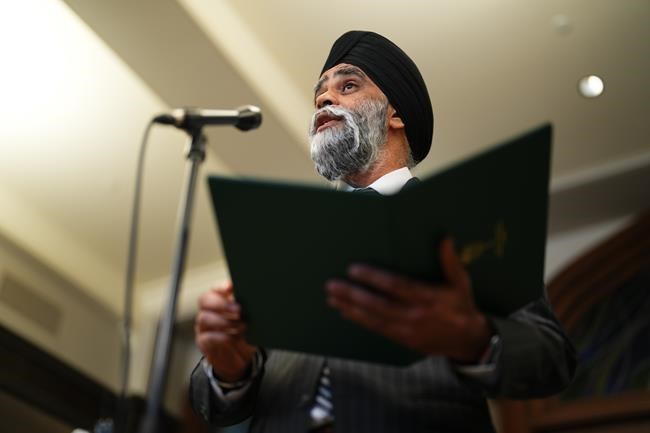OTTAWA — Global Affairs Canada has no sense of whether development aid meant to help women and girls abroad is actually advancing gender equity, according to an audit tabled in Parliament on Monday morning.
"The department was unable to show us how the money invested actually was improving the lives of women and girls," auditor general Karen Hogan told reporters, citing "significant weaknesses" in record keeping.
Hogan found Ottawa does not track whether an annual $3.5 billion in bilateral aid is actually meeting the goals of Canada's Feminist International Assistance Policy, and she noted that aid for Africa has been diverted to Ukraine.
The audit found the department struggled to provide information on projects because of a lack of standardized record keeping and forms not getting filled out.
"Some of the required information had been stored on computers of staff who had since left the department, so officials were unable to find the required information," the report says.
"The department missed an opportunity to demonstrate the value of international assistance."
Last year, the Organisation for Economic Co-operation and Development ranked Canada and Iceland first for their spending on foreign aid that contributes to gender equality.
But the audit says Ottawa can’t track of whether money is helping improve the lives of women and girls.
Hogan separately told a House committee that her staff shelved plans to do a deeper dive into how Ottawa undertakes gender-based analyses because it took so long to get the information.
"It took several months for us to gain access to the information we had requested," she told reporters. "That just tells me people aren't using it for day-to-day information and decision-making."
Still, Hogan found that Global Affairs Canadatracks indicators — but not actual progress — on half of the projects covered by the audit.
In one case, this saw the department assessing how many people received food but not whether their health had improved.
In another, programs meant to keep teen girls in school during menstruation did track whether Canada's funding created separate bathrooms and handwashing facilities in schools, but did not assess whether this had improved school attendance.
These difficulties with measuring outcomes applied for 24 out of 26 of the department's stated policy indicators, in part due to poor data collection, Hogan found.
"While individual project files included useful information, because of the weaknesses in information management practices … this information was not being rolled up and used at the departmental level," the audit says.
"Senior management did not, and were unable to, review the complete impact of programming. Without a full account of project outcomes, senior management could not respond to evolving conditions and make changes to improve policy implementation."
However, the audit did find that Global Affairs Canada is generally successful at designing programs through an equity lens using the criteria set out under its gender-based analysis, with more than 80 per cent of spending going to projects that integrate gender.
Yet the auditor warns this is coming at the expense of meeting another target, which is to have at least 15 per cent of project funding directly target the empowerment of women and girls, instead of just including them in projects.
The report notes that academics generally say this is required in order to produce meaningful change that makes countries less reliant on foreign aid.
"It was highly problematic that critical information, such as project progress reports, could not be readily found," the audit reads.
The department says it accepts the findings of the audit and is planning to shore up its data collection.
"Improving our reporting is imperative, for transparency, accountability and also for decision-making," International Development Minister Harjit Sajjan told reporters on Parliament Hill.
He stressed that the information that is being gathered by needs to be better collated, and suggested that he could also assess projects through personal visits.
"I have visited a lot of the projects and I've spoken with a lot of the organization that actually are delivering the projects to see first-hand what are the actual results, what are the outcomes," Sajjan said
That comment was ridiculed as by "crazy" by Conservative development critic Garnett Genuis.
"The fact that the minister thinks that spending a few days in a project site supplants the important analysis work that the government is supposed to be doing on an objective basis is really, really concerning," he said.
"The government's policy here is to talk a lot about the importance of gender, to make that part of their political discourse here, but they don't care enough to actually measure the results."
Hogan said Global Affairs Canada is undertaking training for staff so that they more consistently track and report information. She said she urged bureaucrats to set up interim changes that could take place while the department gets its house in order.
Auditors only looked at direct development aid, which excludes the one-third of Canada's aid dollars that are sent to United Nations organizations or as humanitarian relief to emerging crises.
The analysis examined records Ottawa created and assembled in the four years ending in March 2021, but not the actual activities of the foreign groups that get Canadian funding.
The audit noted that Canada missed its target for half of bilateral aid to be sent to sub-Saharan Africa, because "the department reallocated money to respond to needs emerging from the coronavirus disease (COVID-19) pandemic and the invasion of Ukraine."
Hogan's office said it lacked specific information on how much money had been diverted to each.
Sajjan contested Hogan's characterization of the funding being reallocated, saying that the Liberals instead spent more on development aid and that this caused them to miss their target for the percentage of development dollars reaching Africa.
This report by The Canadian Press was first published March 27, 2023.
— With files from Laura Osman and Mickey Djuric.
Dylan Robertson, The Canadian Press



